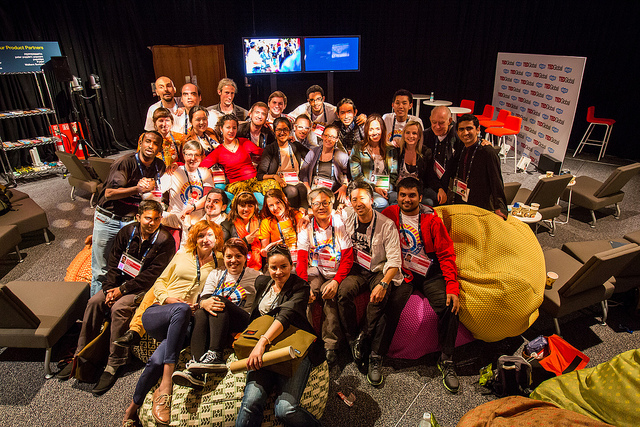
The TEDGlobal translator contingent — part of a group of more than 9,000 volunteer translators in 101 languages. Photo: Ryan Lash
“I write sci-fi novels, because if I wrote a white paper nobody would read it,” Daniel Suarez told a panel of translators at TEDGlobal 2013. The science fiction author and drone activist was taking questions during his Skype Open Translation session, in which he described a dystopic–and all too believable–future dominated by autonomous lethal drones. His audience sat on the edge of their seats (or beanbags), bursting with questions. For instance, German translator Philipp Boing asked why he used science fiction as a medium to warn about such a dire vision of the future. Avoiding obscurity was a pretty solid answer.
During breaks between talk sessions throughout the week, a curated panel of TEDGlobal speakers and TED Talk translators–appearing in person and via videoconference–discussed topics like drone warfare, cultural identity, humor and guerrilla urban development. While the translators and speakers did not always directly address the topic of translation itself, the theme remained a powerful undercurrent. And many of the translators’ questions for the speakers shared a theme, too. One favorite: “How will you (or I) carry your ideas off of the TED stage?”
Just as there is no such thing as a definitive translation, none of the speakers claimed to have a singular answer. For Suarez, fiction was one relatable way to convey his message. But he also works with advocacy organizations, hypothesizes legal frameworks, and models an open-source “immune system” designed to allow citizens to monitor rogue drones.
We know that ideas, predictions and solutions for the future come from a lucky intersection of what we know and observe with our informed imagination. When Teddy Cruz observed how Tijuana residents retrofitted their generic, developer-built bungalows, he saw a density of social and economic interactions that’s missing in certain sprawling, oil- and water-guzzling American cities. Swedish translator Matti Jaaro asked him how it might be possible to reinvigorate a sense of ownership among urban dwellers, rich or poor. Cruz answered that not only did he see in these developing-world neighborhoods a model to rein in sprawl, but also an opportunity to “establish a social platform through a kind of urban pedagogy.” In other words: reinvent the negative connotation of “slums” and invest in parks and social spaces in neighborhoods that are already vibrant, but lack a voice.
Translators are key to this process of reinventing assumptions and giving a voice to the unheard. They have first-hand familiarity with the power of language to generate ideas–for good or bad. Translator Katia Demirtzoglou, talking with artist Hetain Patel about language’s effect on cultural identity, described the unique brand of humor her multilingual family had developed as a result of rapidly switching among German, English and Turkish. “Others often don’t understand the jokes between us,” she said. Yet.
Comments (6)
Pingback: Why Translation is Important in An English-Speaking World
Pingback: Why Translation is Important in An English-Speaking World
Pingback: Why Translation is Important In a English- Speaking World – Septian Aldi Syaputra
Pingback: How to spread ideas: Speakers and translators at TEDGlobal 2013 | TED Blog | OVLanguages